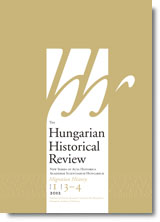The Discourse on Forced Migration and European Culture of Remembrance
The Discourse on Forced Migration and European Culture of Remembrance
Author(s): Stefan TroebstSubject(s): History
Published by: Magyar Tudományos Akadémia Bölcsészettudományi Kutatóközpont Történettudományi Intézet
Summary/Abstract: The project of a ‘Centre against Expulsions’ proposed in 2000 by the German Union of Expellees in order to commemorate the fate of some 12 million Germans who fled or were forced to leave Central and Eastern Europe in and after 1945 caused a fierce Polish-German media controversy. This had a fourfold result: (1) The governments in Warsaw and Berlin together with those in Bratislava and Budapest agreed in 2004 to found a ‘European Network Remembrance and Solidarity’ in order to deal with the tragic history of Europe in the twentieth century in a manner that fostered some consensus; (2) the Parliamentary Assembly of the Council of Europe proposed to set up a ‘European Remembrance Centre of Victims of Forced Population Movements and Ethnic Cleansing’ in 2005; (3) in 2007, the Polish government decided to found a ‘Museum of the Second World War’ in Gdansk with the aim of putting the Polish view of recent history into a European context; and in 2008 the German government erected a federal Foundation ‘Flight, Expulsion, Reconciliation’ in Berlin which was given the task of designing a permanent exhibition on the fate of the expelled Germans, again in the context of the history of twentieth-century Europe. Whereas more often than not the national memories of Germans, Poles and other Europeans clash over the Second World War and its consequences, the very fact that in Central Europe a bilateral or multilateral discourse on these sensitive topics is feasible is a remarkable post-1989 improvement.
Journal: The Hungarian historical review : new series of Acta Historica Academiae Scientiarum Hungaricae
- Issue Year: 1/2012
- Issue No: 3-4
- Page Range: 397-414
- Page Count: 18
- Language: English

